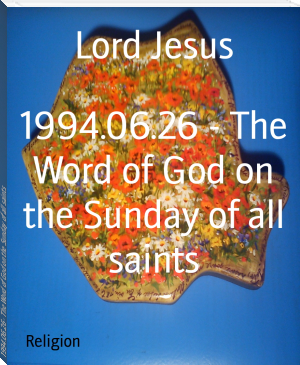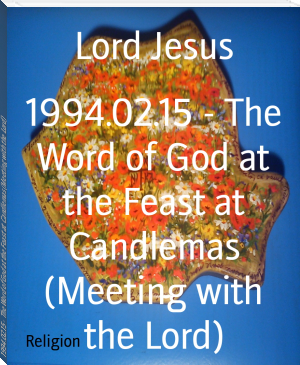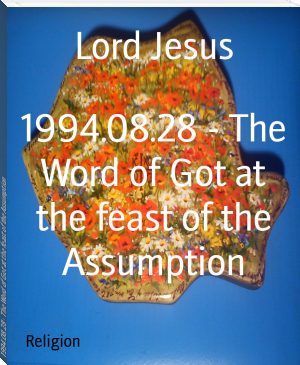Orthodoxy - G. K. Chesterton (books to read to get smarter .TXT) 📗

- Author: G. K. Chesterton
- Performer: -
Book online «Orthodoxy - G. K. Chesterton (books to read to get smarter .TXT) 📗». Author G. K. Chesterton
If I am asked, as a purely intellectual question, why I believe in Christianity, I can only answer, “For the same reason that an intelligent agnostic disbelieves in Christianity.” I believe in it quite rationally upon the evidence. But the evidence in my case, as in that of the intelligent agnostic, is not really in this or that alleged demonstration; it is in an enormous accumulation of small but unanimous facts. The secularist is not to be blamed because his objections to Christianity are miscellaneous and even scrappy; it is precisely such scrappy evidence that does convince the mind.
I mean that a man may well be less convinced of a philosophy from four books, than from one book, one battle, one landscape, and one old friend. The very fact that the things are of different kinds increases the importance of the fact that they all point to one conclusion. Now, the non-Christianity of the average educated man to-day is almost always, to do him justice, made up of these loose but living experiences. I can only say that my evidences for Christianity are of the same vivid but varied kind as his evidences against it. For when I look at these various anti-Christian truths, I simply discover that none of them are true.
I discover that the true tide and force of all the facts flows the other way. Let us take cases. Many a sensible modern man must have abandoned Christianity under the pressure of three such converging convictions as these: first, that men, with their shape, structure, and sexuality, are, after all, very much like beasts, a mere variety of the animal kingdom; second, that primeval religion arose in ignorance and fear; third, that priests have blighted societies with bitterness and gloom. Those three anti-Christian arguments are very different; but they are all quite logical and legitimate; and they all converge. The only objection to them (I discover) is that they are all untrue. If you leave off looking at books about beasts and men, if you begin to look at beasts and men then (if you have any humour or imagination, any sense of the frantic or the farcical) you will observe that the startling thing is not how like man is to the brutes, but how unlike he is. It is the monstrous scale of his divergence that requires an explanation.
That man and brute are like is, in a sense, a truism; but that being so like they should then be so insanely unlike, that is the shock and the enigma. That an ape has hands is far less interesting to the philosopher than the fact that having hands he does next to nothing with them; does not play knuckle-bones or the violin; does not carve marble or carve mutton. People talk of barbaric architecture and debased art. But elephants do not build colossal temples of ivory even in a roccoco style; camels do not paint even bad pictures, though equipped with the material of many camel’s-hair brushes.
Certain modern dreamers say that ants and bees have a society superior to ours. They have, indeed, a civilization; but that very truth only reminds us that it is an inferior civilization. Who ever found an ant-hill decorated with the statues of celebrated ants?
Who has seen a bee-hive carved with the images of gorgeous queens of old? No; the chasm between man and other creatures may have a natural explanation, but it is a chasm. We talk of wild animals; but man is the only wild animal. It is man that has broken out.
All other animals are tame animals; following the rugged respectability of the tribe or type. All other animals are domestic animals; man alone is ever undomestic, either as a profligate or a monk.
So that this first superficial reason for materialism is, if anything, a reason for its opposite; it is exactly where biology leaves off that all religion begins.
It would be the same if I examined the second of the three chance rationalist arguments; the argument that all that we call divine began in some darkness and terror. When I did attempt to examine the foundations of this modern idea I simply found that there were none. Science knows nothing whatever about prehistoric man; for the excellent reason that he is prehistoric. A few professors choose to conjecture that such things as human sacrifice were once innocent and general and that they gradually dwindled; but there is no direct evidence of it, and the small amount of indirect evidence is very much the other way. In the earliest legends we have, such as the tales of Isaac and of Iphigenia, human sacrifice is not introduced as something old, but rather as something new; as a strange and frightful exception darkly demanded by the gods.
History says nothing; and legends all say that the earth was kinder in its earliest time. There is no tradition of progress; but the whole human race has a tradition of the Fall. Amusingly enough, indeed, the very dissemination of this idea is used against its authenticity.
Learned men literally say that this prehistoric calamity cannot be true because every race of mankind remembers it. I cannot keep pace with these paradoxes.
And if we took the third chance instance, it would be the same; the view that priests darken and embitter the world. I look at the world and simply discover that they don’t. Those countries in Europe which are still influenced by priests, are exactly the countries where there is still singing and dancing and coloured dresses and art in the open-air. Catholic doctrine and discipline may be walls; but they are the walls of a playground. Christianity is the only frame which has preserved the pleasure of Paganism. We might fancy some children playing on the flat grassy top of some tall island in the sea. So long as there was a wall round the cliff’s edge they could fling themselves into every frantic game and make the place the noisiest of nurseries. But the walls were knocked down, leaving the naked peril of the precipice. They did not fall over; but when their friends returned to them they were all huddled in terror in the centre of the island; and their song had ceased.
Thus these three facts of experience, such facts as go to make an agnostic, are, in this view, turned totally round. I am left saying, “Give me an explanation, first, of the towering eccentricity of man among the brutes; second, of the vast human tradition of some ancient happiness; third, of the partial perpetuation of such pagan joy in the countries of the Catholic Church.” One explanation, at any rate, covers all three: the theory that twice was the natural order interrupted by some explosion or revelation such as people now call “psychic.” Once Heaven came upon the earth with a power or seal called the image of God, whereby man took command of Nature; and once again (when in empire after empire men had been found wanting) Heaven came to save mankind in the awful shape of a man.
This would explain why the mass of men always look backwards; and why the only corner where they in any sense look forwards is the little continent where Christ has His Church. I know it will be said that Japan has become progressive. But how can this be an answer when even in saying “Japan has become progressive,” we really only mean, “Japan has become European”? But I wish here not so much to insist on my own explanation as to insist on my original remark.
I agree with the ordinary unbelieving man in the street in being guided by three or four odd facts all pointing to something; only when I came to look at the facts I always found they pointed to something else.
I have given an imaginary triad of such ordinary anti-Christian arguments; if that be too narrow a basis I will give on the spur of the moment another. These are the kind of thoughts which in combination create the impression that Christianity is something weak and diseased. First, for instance, that Jesus was a gentle creature, sheepish and unworldly, a mere ineffectual appeal to the world; second, that Christianity arose and flourished in the dark ages of ignorance, and that to these the Church would drag us back; third, that the people still strongly religious or (if you will) superstitious—such people as the Irish—are weak, unpractical, and behind the times.
I only mention these ideas to affirm the same thing: that when I looked into them independently I found, not that the conclusions were unphilosophical, but simply that the facts were not facts.
Instead of looking at books and pictures about the New Testament I looked at the New Testament. There I found an account, not in the least of a person with his hair parted in the middle or his hands clasped in appeal, but of an extraordinary being with lips of thunder and acts of lurid decision, flinging down tables, casting out devils, passing with the wild secrecy of the wind from mountain isolation to a sort of dreadful demagogy; a being who often acted like an angry god—
and always like a god. Christ had even a literary style of his own, not to be found, I think, elsewhere; it consists of an almost furious use of the A FORTIORI. His “how much more” is piled one upon another like castle upon castle in the clouds. The diction used ABOUT Christ has been, and perhaps wisely, sweet and submissive.
But the diction used by Christ is quite curiously gigantesque; it is full of camels leaping through needles and mountains hurled into the sea. Morally it is equally terrific; he called himself a sword of slaughter, and told men to buy swords if they sold their coats for them. That he used other even wilder words on the side of non-resistance greatly increases the mystery; but it also, if anything, rather increases the violence. We cannot even explain it by calling such a being insane; for insanity is usually along one consistent channel. The maniac is generally a monomaniac. Here we must remember the difficult definition of Christianity already given; Christianity is a superhuman paradox whereby two opposite passions may blaze beside each other. The one explanation of the Gospel language that does explain it, is that it is the survey of one who from some supernatural height beholds some more startling synthesis.
I take in order the next instance offered: the idea that Christianity belongs to the Dark Ages. Here I did not satisfy myself with reading modern generalisations; I read a little history.
And in history I found that Christianity, so far from belonging to the Dark Ages, was the one path across the Dark Ages that was not dark.
It was a shining bridge connecting two shining civilizations.
If any one says that the faith arose in





Comments (0)